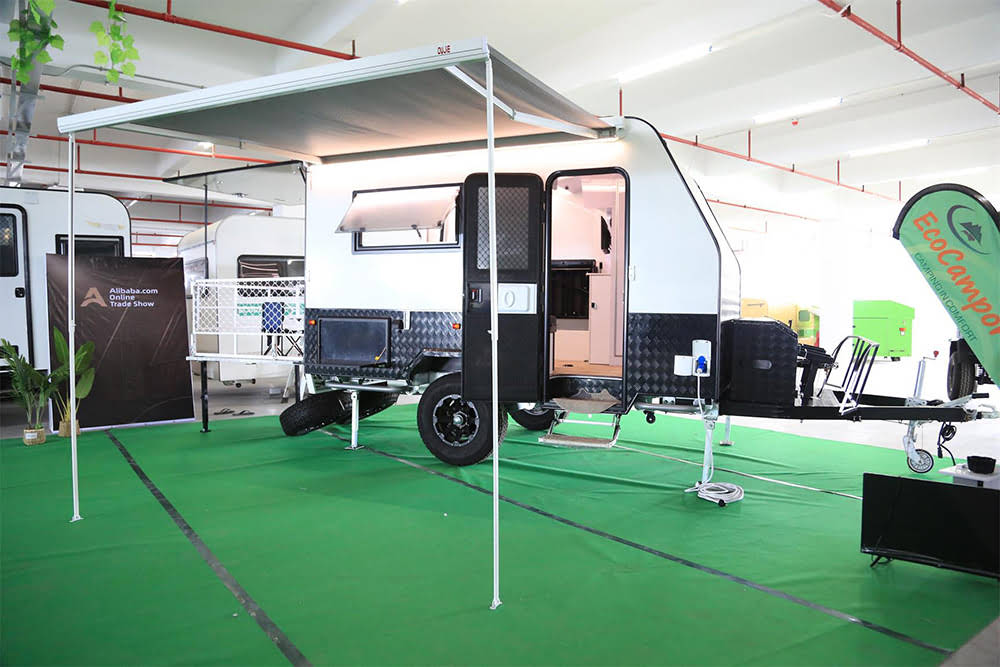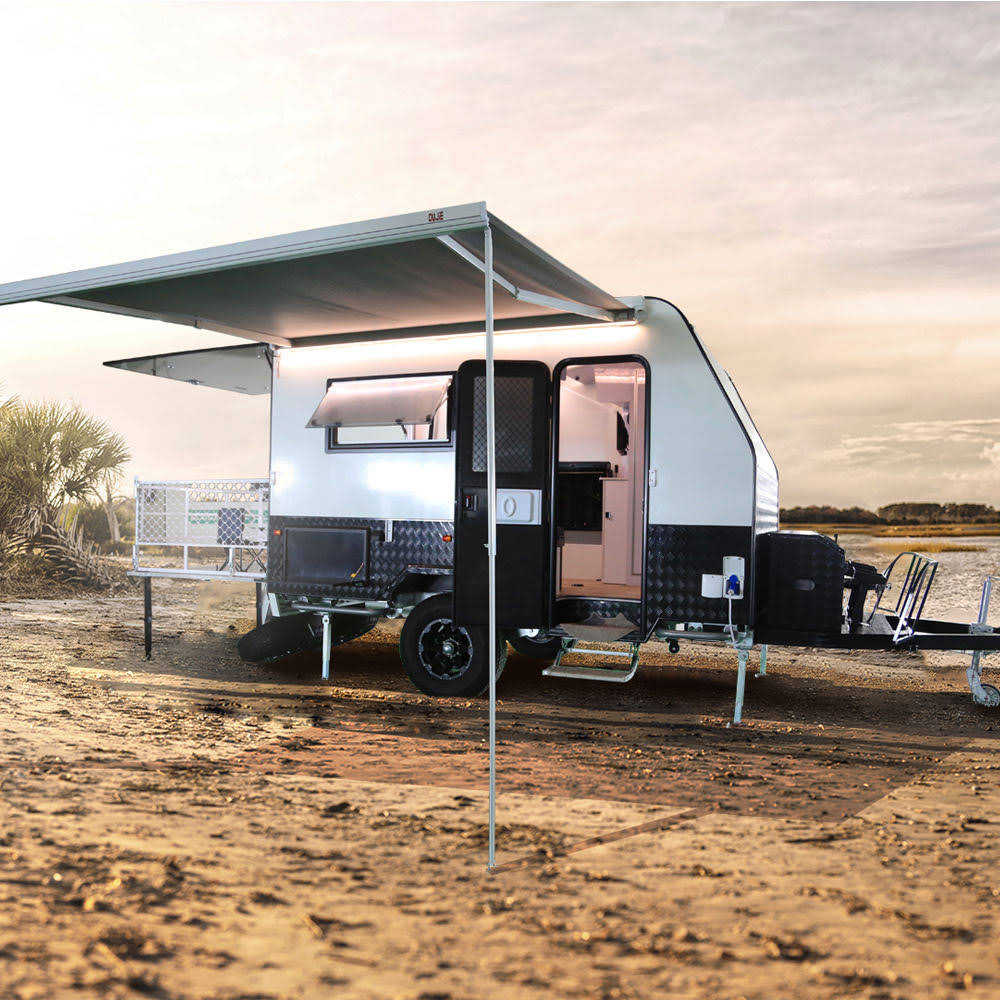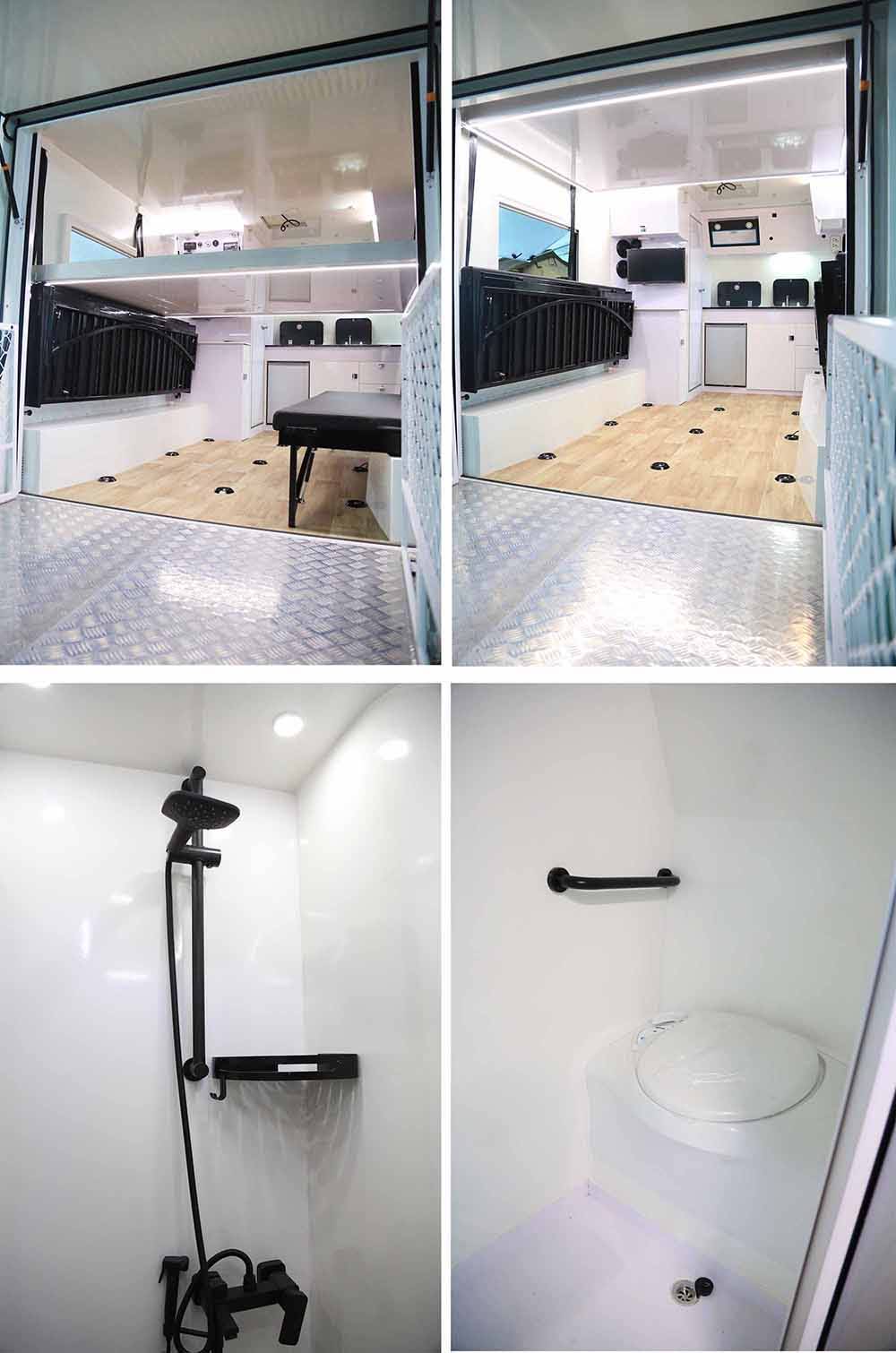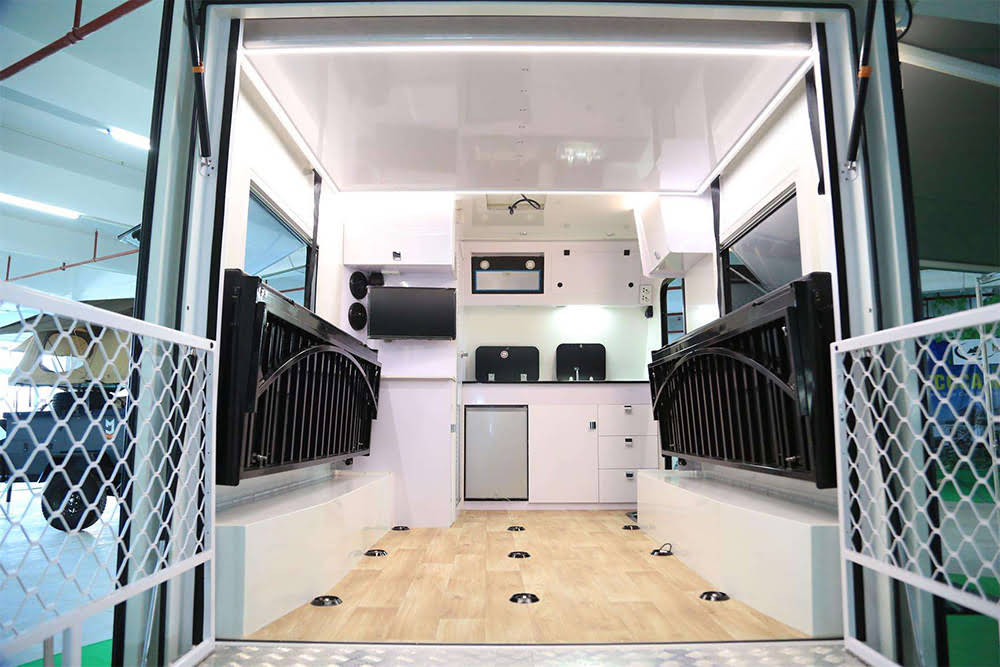Expert Tips for Choosing an Off Road Hybrid Caravan

Are you dreaming of an exciting trip off the main roads? Picking the right Off Road Hybrid Caravan is very important. Hybrid caravans are now a favorite for many travelers. Why is that? They are tough but also have modern comforts. This makes them great for visiting faraway places. More people, especially millennials, want eco-friendly and flexible travel options. Because of this, caravan manufacturers are creating more models to choose from. Are you ready to find the best one for you? Let’s get started!
Key Takeaways
Pick a sturdy frame for your caravan. A strong frame keeps it safe on bumpy roads.
Make sure it has at least 12 inches of clearance. This height stops damage on rough trails.
Choose independent suspension for a comfy ride. It lessens bumps and keeps your caravan safe.
Think about how much water it can hold. Bigger tanks mean longer trips without refilling.
Check that the caravan's weight fits your car's towing limit. This makes towing safe and steady.
What Is an Off Road Hybrid Caravan?
Definition and Features
Mixes comfort with off-road strength
An off-road hybrid caravan blends comfort with adventure. It can handle rough paths but still feels like home. Imagine a strong, mobile home that goes anywhere. These caravans use tough materials like light metals and composites. This makes them strong and easy to pull. They also have special suspension to make bumpy rides smoother.
With a hybrid caravan, you get both comfort and adventure. They include small kitchens, cozy beds, and even air systems. Whether you're in the mountains or desert, you’ll stay comfy while exploring nature.
Built for roads and rough trails
A hybrid off-road caravan is very flexible. It works well on highways and rocky paths. You can switch from smooth roads to rough trails easily. Features like higher ground clearance and strong frames help it handle uneven paths.
Differences from Traditional Caravans
Stronger and better for off-road trips
Hybrid off-road caravans are tougher than regular caravans. They use materials like aluminum and strong plastics. This makes them lighter and longer-lasting. They save fuel and are easier to tow. They also have special suspension to handle rough roads better.
Small size with modern features
Hybrid caravans are small but very useful. They have fold-out beds, smart storage, and solar panels. Regular caravans are bigger but less suited for rough paths. Hybrid caravans give you comfort and adventure in one small, tough package.

Key Things to Think About When Picking an Off Road Hybrid Caravan
Chassis and Build Strength
Why a strong chassis matters
The chassis is like the skeleton of your caravan. A strong chassis helps it survive bumpy and rough roads. Without it, other features won’t work well. Companies like Legend Caravans use tough materials and smart designs. They also test their caravans to make sure they last in tough conditions.
Best materials for off-road caravans
Look at the materials used to build the caravan. Aluminum or a mix of steel and aluminum are great options. These materials are strong but light, making towing easier. A lighter caravan also uses less fuel, saving you money over time.
Ground Clearance
Why ground clearance is important
Ground clearance is how high the caravan sits off the ground. It helps the caravan avoid scraping on uneven paths. Higher clearance keeps parts like the suspension and water tanks safe from damage.
How much clearance you need
For off-road trips, aim for at least 12 inches of clearance. This height helps you handle rocky or muddy trails easily. Adjustable suspension can also help you adapt to different road types.
Suspension Systems
Types of suspension for off-road caravans
The suspension system affects how smooth your ride feels. Leaf spring suspensions are common, but independent suspensions are better for rough roads. They handle bumps and shocks more effectively.
Why independent suspension is better
Independent suspension makes off-road travel more comfortable. Each wheel moves on its own, reducing bumps and jolts. This gives you a smoother ride and protects your caravan from damage. Companies like Star Vision Caravans test their suspensions to ensure comfort and stability.

Rear Departure Angle
Helps with steep slopes
The rear departure angle is key for rough trails. It shows how well your caravan handles steep slopes. If the angle is too small, the back might scrape. This can cause damage or expensive repairs.
A good angle helps avoid hitting rocks or roots. It makes steep paths easier to handle. You’ll feel safer knowing your caravan is ready for tough trails.
Best angles for off-road trips
For off-road trips, aim for at least 30 degrees. This angle gives enough space to clear steep slopes. Some caravans let you adjust the angle for different paths. Always check the specs to match your needs.
Water Storage and Capacity
Why water storage matters
Water is very important for remote trips. You need it for drinking, cooking, and cleaning. A caravan with big water tanks lets you stay away longer.
What to check in water tanks
Choose tanks made from safe materials for drinking water. Some caravans have filters for clean water anywhere. Make sure the tanks are easy to reach and use.
Couplings and Towing Stability
Best couplings for rough roads
Off-road trips need strong couplings. Articulating couplings work well for uneven paths. They let the caravan move freely with your car.
Keeping your caravan steady
Towing stability keeps your caravan safe on bumpy roads. Good couplings stop swaying and keep control. Look for anti-sway systems for a smoother ride.
Weight and Towing Capacity
Match the caravan's weight to your car's towing ability
Before picking a hybrid caravan, check your car’s towing limit. This ensures your car can safely pull the caravan’s weight. Overloading can harm your car or cause accidents. You can find the towing limit in your car’s manual or online.
When comparing caravans, check their Aggregate Trailer Mass (ATM). This is the total weight when fully loaded. Make sure the ATM fits within your car’s towing capacity. Hybrid caravans are lighter than regular ones, making them easier to tow.
Why balanced weight matters
Balanced weight is important for safe towing. Uneven weight can make the caravan sway on rough roads. To prevent this, pack heavy items near the caravan’s axle. Many hybrid caravans include hitches to help balance the load.
Tip: Weigh your caravan after packing to stay safe. Portable scales can help you check the weight.

Interior Layout and Comfort
Smart designs for small spaces
Hybrid caravans use smart layouts to save space. They include fold-out beds, slide-out kitchens, and hidden storage. These features keep the caravan small but useful.
Key features for comfort
Comfort is important for long trips. Look for a cozy bed, a good kitchen, and a practical bathroom. Some caravans also have outdoor showers and awnings for extra convenience.
Note: Walk through the caravan before buying. Make sure the layout works for you.
Climate Control Features
Staying comfy in all weather
Weather can change quickly during off-road trips. A good climate system keeps you cool or warm as needed. This is helpful if you travel in different seasons.
Best climate control options
Choose caravans with air conditioning and heaters. Roof vents and fans improve airflow. Solar-powered systems are great for eco-friendly travelers. They let you stay comfy without needing outside power.
Pro Tip: Insulated walls and windows help keep the caravan’s temperature steady.
Matching Your Choice to Your Needs
Understanding Your Travel Habits
How often and where you travel
How you travel affects the caravan you need. Do you go off-road often or just on weekends? For frequent trips, pick strong materials, good suspension, and high clearance. These features help your caravan handle rough paths while staying comfy.
If you travel less, you may not need heavy-duty features. Focus on a mix of strength and cost. Think about how far you’ll go and the roads you’ll take. This way, you won’t pay for things you won’t use.
How many people are traveling
The number of travelers decides the caravan’s size and layout. If you’re alone or with one person, a small caravan with smart storage works well. Families or groups need more space and features. Look for fold-out beds, big water tanks, and good layouts to keep everyone happy.
Tip: Plan for the future. If you might travel with more people later, pick a caravan that can adjust to those needs.
Budget Planning
Choosing features within your budget
Your budget matters when buying a caravan. It’s tempting to pick the fanciest model, but focus on what you need most. Strong materials, good suspension, and enough water storage are key. Avoid extras you don’t need to save money.
Thinking about long-term costs
Don’t just look at the price tag. Owning a caravan means paying for insurance, repairs, and upkeep. Surprise costs can add up too. A detailed budget helps you prepare. Spending more on a quality caravan now can save money later by needing fewer repairs.
Research and Expert Help
Why reviews and testimonials matter
Before buying, read reviews from users and experts. User reviews show how caravans work in real life. You’ll learn about comfort, strength, and problems. Expert reviews explain technical details like suspension and insulation.
Users share real-life experiences.
Experts compare models and explain features.
Knowing trends helps you make a smart choice.
Getting advice from experts or owners
Talking to caravan owners can help a lot. They know the buying process and can give useful tips. Experts, like those at Campground Consulting Group, offer advice on what works best. Their help can stop you from making mistakes and guide you to the right caravan.
Source | Insights |
|---|---|
Campground Consulting Group | Gives expert tips on planning, best practices, and research. |
Pro Tip: Join caravan clubs or online groups to meet experienced travelers. Their advice can help you pick the best caravan.
Picking the best off-road hybrid caravan is not just about buying a vehicle. It’s about making sure your trip is safe, comfy, and easy. Knowing the important features helps you choose wisely. Here’s why these features matter:
Why It’s Important | |
|---|---|
Build Material | Impacts strength and weight, needed for tough roads. |
Ground Clearance | Helps avoid damage on bumpy or uneven paths. |
Rear Departure Angle | Stops the back from scraping on rough trails. |
Water Tank Size | Needed for long trips; makes the caravan more useful. |
Independent Suspension | Reduces bumps, giving a smoother and steadier ride. |
Couplings | Keeps the caravan safe and steady while towing. |
Think about how you travel, your budget, and must-have features. Whether you go off-road often or just sometimes, pick a caravan that fits your life. Visit a dealer or ask experts for advice. Get ready for an amazing adventure!
FAQ
How is an off-road hybrid caravan different from a regular one?
Off-road hybrid caravans are stronger and more durable. They have tough frames, higher clearance, and better suspension. These features help them handle rough roads easily. At the same time, they offer comforts like small kitchens and comfy beds. They combine adventure with convenience perfectly!
How can I check if my car can tow a hybrid caravan?
Look at your car’s towing limit in the manual or online. Compare it to the caravan’s total loaded weight (ATM). Make sure your car can pull the weight safely. Overloading can harm your car or make towing unsafe.
Are off-road hybrid caravans good for families?
Yes, they are great for families! Many have fold-out beds, clever storage, and roomy designs. Families will love features like big water tanks and outdoor kitchens. Pick a model that suits your family size and travel plans.
Do I need special training to tow an off-road hybrid caravan?
Not really, but practice makes it easier! Start with short drives to learn. Practice reversing, parking, and driving on bumpy roads. Use anti-sway tools and balance the weight for safer towing.
Can I use an off-road hybrid caravan in any weather?
Yes, you can! Many have air conditioning, heaters, and insulated walls. These keep you cozy in hot or cold weather. Some even have solar panels for eco-friendly energy.
Tip: Check the caravan’s weatherproofing before you buy it.
